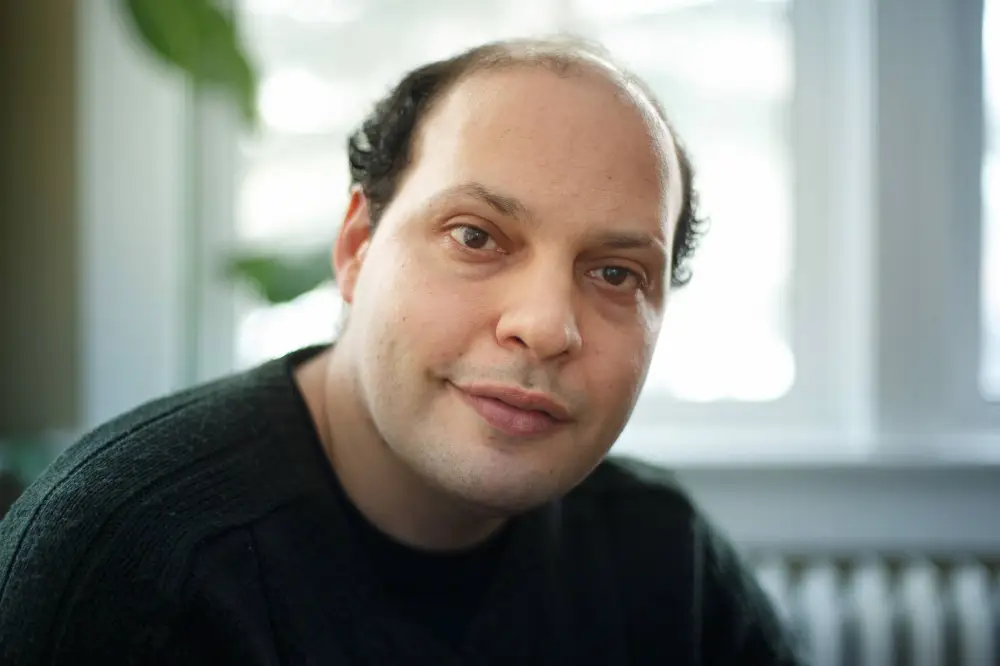Local News
Shalom Residences’ Executive Director Mike Goldberg looks back on 3 years in the job

By BERNIE BELLAN Three years ago – almost to the date (March 30), I reported on the retirement of of one of the longest-serving executive directors of an agency within the Jewish community: Nancy Hughes.
Nancy had been serving as executive director of Shalom Residences since 1991. The very first Shalom Residence opened in 1980, which means Shalom Residences will be celebrating its 45th anniversary this year.
Among the 12 agencies that receive funding from the Winnipeg Jewish Federation, Shalom Residences though might have one of the lowest profiles, as it serves a fairly small segment of the community – adults with special needs intellectual disabilities. As previous editor of The Jewish Post & News and, prior to that, when my late brother Matt served as editor, we always tried to give Shalom Residences due recognition. One of the reasons, as current Shalom Residences executive director Michael Goldberg explained during a recent phone conversation we had, is that there are members of our community who may not be aware of what Shalom Residences provide – and who may have children who would benefit from living in one of the residences once they reach adulthood.
It may be hard to believe, but two of the original residents in that very first Shalom Residence (on Enniskillen Avenue) still remain residents of Shalom Residences. (There are five other homes that house Shalom residents: On Hartford Avenue and Seven Oaks Place – both in West Kildonan, McAdamCathedral Avenue – in the North End, Daffodil – in Garden City; and Oxford Street, in River Heights.)
The smallest home has three residents and the largest one – five.
Twenty-nine adults live in those homes, while another nine live in supported independent living apartments, and three adults are supported in community outreach.
When Nancy Hughes retired in 2022, the effects of the Covid-19 epidemic were still being widely felt. In fact, there were two vacancies within Shalom Residences at that time, as I explained in my March 30 article: “Nancy explained, with the onset of Covid in 2020 a number of parents who might otherwise have wanted to place a child in one of the homes drew back from doing so out of fears that their loved one might contract Covid.”
Actually, the term “child” in referring to residents of Shalom Residences is a misnomer. In order to qualify for residency in one of the residences, one must be at least 18 years of age, but the fact is there has been very little turnover among residents over the years. One of the original Shalom residents, Rochelle Bronstein, just passed away in July last year. Rochelle had moved into a Shalom residence when she was in her twenties. According to Shalom Residences’ annual report, the average age of residents is now 54.
For those readers not familiar with Shalom Residences, its Mission and Vision are stated on the organization’s website:
“To support people with intellectual disabilities in the mainstream of community life so that they may conduct their lives in a meaningful dignified way.To empower adults with intellectual disabilities to live meaningful, dignified lives in community based homes in Winnipeg, enriched by Jewish values.
“Shalom envisions a community where individuals with intellectual disabilities are fully included, self-actualized, and valued in all aspects of life.
“Their values are:
“Inclusion: Shalom believes in the right of every individual to have opportunities to be an active, respected member of their community.
“Empowerment: Shalom supports adults in building capacity to achieve their individualized goals.
“Jewish Heritage: Shalom is committed to providing support that reflects the values and traditions of the Jewish community. They also support individuals to participate in the richness of their chosen religion and culture.
“Awareness & Acceptance: Shalom strives to foster understanding and acceptance of individuals with intellectual disabilities as valued members of the community.
“To enable people with intellectual disabilities to become as self-sufficient as possible.
“To create and maintain Judaic oriented programs for people with intellectual disabilities which reflect the philosophy of Shalom Residences Inc.
“To develop community awareness of, and increase community acceptance of, people with intellectual disabilities as full and equal citizens.
“To enable the persons in Shalom Residences’ programs to achieve their potential as contributing members of our community, and to become as self sufficient as possible.”
In 2022 Michael Goldberg took over as executive director of Shalom Residences. In my March 2022 article about Nancy Hughes’ retirement I noted that Michael was the son of Mark and Kathryn Goldberg, had attended Ramah Hebrew School, Gray Academy, and the University of Winnipeg Collegiate. Michael had also attended Winthrop University in South Carolina, where he had obtained a bachelors degree in Psychology. (He noted that he had actually gone to university on a golf scholarship!)
Later, Michael said, he obtained his masters degree in Gerontology in Regina.
Since 2015, he had been working at Palliative Manitoba in the Deer Lodge Centre Palliative Care.
Even before coming to Shalom Residences, Michael says that he had developed a familiarity with the program, as he “was able to facilitate courses in compassionate care for Shalom Residences staff members.”
Recently, I had a chance to talk with Michael Goldberg – to ask him now that he’s had to gain some experience, how he’s found working as executive director of Shalom Residences?
Michael echoed Nancy’s observation that, as residents of Shalom residences have aged, dealing with aging residents has led to different challenges.
“We want to make sure they’re aging with dignity,” he said, “and that they’re comfortable.”
As well, Michael noted that with the closure of the Manitoba Developmental Centre in Portage and the St. Amant Centre in Winnipeg, the goal now, more than ever, is ” to integrate people (who had previously been institutionalized) “into the community” – something which has been a leading purpose of Shalom Residences since its inception.
I asked Michael how someone who has a child with an intellectual disability and that child is approaching adulthood (or is already an adult) would go through the process of having that child placed in a Shalom Residence?
Michael explained that a parent with a child under 18 who has an intellectual disability has most likely already been in touch with the Department of Families in the provincial government “because they receive funding” from that department “to support their family member.”
“So that’s the first step to make sure you’re eligible to receive funding from Community Living Disability Services, ” he said, “and once people are deemed eligible, and that process involved getting documentation from a physician or psychologist insuring that intellectual impairment was perceived prior to the age of 18, then they can gain access to resources from Shalom Residences if they’re over the age of 18. We have to make sure that they require personal care when it comes to basic needs, management of property, also they have to be Canadian citizens.”
According to its annual report, only 55% of Shalom Residents are Jewish. (Yet, just as the Simkin Centre has a very high proportion of non-Jewish residents, adherence to kashrut is considered a fundamental value of Shalom Residences. I’ll offer no further observations on how important it is for non-Jews to be forced into adhering to the rules of kashrut since I don’t want to elicit another angry letter to the editor of this paper from the Winnipeg Council of Rabbis.) The funding allocated to Shalom Residences from the Jewish Federation, by the way goes to subvent the often extraordinarily high cost of kosher food.
In fact, over 90% of Shalom Residences funding comes from the province. A good chunk of that funding goes to pay the salaries of the 83 staff who work for Shalom Residences, including both part-time and full-time staff.
One of the issues I raised with Michael is the problem raised by the aging of our own Jewish community. As parents of children who have intellectual disabilities may find it increasingly difficult to care for those children – who are now adults – within their own homes, Shalom Residences might be a viable alternative for parents who, until now, would have been reluctant to see their children leave the home.
I wondered whether there is a “wait list” then, of individuals waiting to move into a Shalom residence. I was somewhat surprised to hear from Michael that there is not a wait list.
Again – that might be more of a reflection of a general unawareness of Shalom Residences than anything else because, since Shalom Residences began with only 17 residents in 1984 and has remained constant at roughly 30 residents for several years now – what with the Jewish Federation claiming that our Jewish population has grown hugely in that past 20 years (despite census figures that would show that not to be the case), one would have expected a growth in demand for placements in Shalom Residences, commensurate with that “huge” growth in our Jewish population. (The Federation actually cites the figure of 16,000 in reporting the size of Winnipeg’s Jewish population. The 2020 Canadian census has it at no more than 12,500, but who am I to argue with the Jewish Federation when it comes to embellishing population figures?)
I wondered too whether there were Shalom residents who didn’t have any relatives who had provided care for them – perhaps because those relatives were in need of care themselves or had passed on already – and those Shalom residents were the responsibility of the Public Trustee of Manitoba?
Michael answered that not only is that the case in several instances, it has also been the case that living relatives have considered handinged over responsibility for the care of their children to the Public Trustee because they simply wanted to “relinquish” responsibility for care of a child with intellectual disabilities.
I asked whether there had been any major improvements made to any of the Shalom Homes recently? Michael noted that there had been a major renovation of the kitchen in the McAdam Avenue home – thanks to a donation from the Silver family. (In October 2022 I had reported on another addition to that home when, thanks to a donation from form the Ian and Rochelle Laing Family Foundation, the unfinished basement of that home had been transformed into a beautiful recreation centre, complete with an arts and craft table, exercise equipment, new flooring, a sink, and a chairlift.)
That led me to ask Michael whether perhaps newer members of our community who might have children who would be well served by living in a Shalom Residence are totally oblivious of what Shalom Residences have to offer?
Michael said that, “in fact, we’ve just welcomed a new resident” whose family is from Russia.
“We got in touch with them. There was a vacancy in one of our homes and he actually just moved in.”
Partly in reaction to the unawareness though that exists within many members of our Jewish community about Shalom Residences, Shalom Residences will be “doing a community outreach information night program on Wednesday, April 9, at the Asper Campus in the Kroft Boardroom at 7pm,” Michael said.
Shalom Residences used to hold an annual lottery as well – but it no longer does that. There will be a donor appreciation evening though on May 27 at the Adas-Yeshurun Herzlia Synagogue.
Local News
Vickar Family cuts ribbon on new Tova Vickar and Family Childcare Centre

By MYRON LOVE In the words of Larry Vickar, the Shaarey Zedek’s successful Dor V’ Dor Campaign “is not only a renewal of the synagogue but truly a renewal movement of Jewish life in our community.”An integral part of that renewal movement was the creation of a daycare centre within the expanded synagogue. On Monday, June 23, Larry and Tova Vickar cut the ribbon, thereby officially opening the Tova Vickar and Family Childcare Centre in the presence of 100 of their family members, friends and other supporters of the project.
The short program preceding the morning ribbon-cutting began with a continental breakfast followed by a welcome by both Fanny Levy, Shaarey Zedek’s Board President, and Executive Director Dr. Rena Secter Elbaze. In Elbaze’s remarks, she noted that Larry and Tova wanted their family (including son Stephen and family, who flew in from Florida) and friends at the event to celebrate the opening of the Tova Vickar and Family Childcare Centre, “not because of the accolades, but because, as Larry put it, he hopes that their investment in the congregation will inspire others to do the same.”
“When Larry and I spoke about what this gift meant to him and the message he wanted people to take away,” she continued, “I couldn’t help but connect it to the teachings of Reb Zalman Schachter-Shalomi whose book – Age-ing to Sage-ing – changes the whole way we look at the concept of ageing and basing it on our ancestral teachings.”
She explained that his concept of “Sage-ing” is based on three key ideas – Discover your meaning and purpose; accept our mortality and think about the legacy you want to leave.
“Larry spoke about these exact concepts when we met,” she said.
Elbaze also noted the presence of Shaarey Zedek’s newly-arrived senior Rabbi Carnie Rose, former Rabbi Alan Green, and area MLAs Mike Moroz and Carla Compton.
Larry Vickar expressed his great appreciation for all those in attendance. “Tova and I are deeply moved to stand here with you today for this important milestone in our community”, he said. “We are grateful to be surrounded by all of you, the people we care about, our family and friends… you who have touched our lives and played some part in our journey.”
Local News
New Israeli restaurant opens in River Heights

By BERNIE BELLAN (July 6, 2025) It’s been a long time since our community has been able to welcome the opening of a restaurant that specializes in Israeli food.
That void is now filled with the opening of The Green Falafel, at 1833 Grant (corner of Centennial – next to the Subway), which opened its doors (to huge crowds) on Monday, July 7.

(owners Ariel & Elena Maudi second and third from left)
The restaurant is the fulfillment of a dream long held by the husband and wife team of Ariel and Eden Maudi, who have been living in Winnipeg the past 11 years.
Ariel, who was born in Israel and grew up in Beer Sheva, says that he worked in telecommunications in Ramat Gan for several years. He adds though that he had always dreamed of owning his own falafel stand in Israel, but life was difficult there and he decided to come to Canada as a tourist to see whether there were any opportunities here for him, Eden and their two young children.
Eden, who was born in Russia and moved to Israel with her family in 1996, stayed behind with the two kids, who were both pre-schoolers, while Ariel tested the waters in Canada first.
Ariel says he came to Canada as a tourist in 2013. His first stop was in Toronto, where he acquired his 1st class driver’s license. At the end of 2013 he moved to Winnipeg where he began working as a truck driver. Soon he found himself employed as a successful sales person at Vickar Nissan where, he says, he once achieved the status as the top car sales person in Canada. After working at Vickar Nissan for a number of years, Ariel began working as an installer for Bell MTS.
Meanwhile, Eden began working at a Walmart, later at the Costco on Regent.

But, when the opportunity to move into a space that had been previously occupied by another restaurant, but which had closed, became available, Ariel and Eden decided to open their own Israeli restaurant in an area that hadn’t seen Israeli food served since the controversial closure of Bermax Café in 2019.
The Maudis say that they will be serving a variety of Israeli dishes – all vegetarian, and that they will be fully kosher.
The “green” in Green Falafel, by the way, Ariel Maudi explains, comes from the cilantro and parsley that are added to the chickpeas. In addition, their pitas will be coming from Israel and will be baked fresh daily.
The Green Falafel is open from 10-8 Sunday – Thursday and 10-4 on Friday. (Closed Saturday).Delivery will be available through Uber Eats and DoorDash.
Call 204-557-7837 for information.
Local News
Previews of shows with Jewish performers at this year’s Fringe Festival July 16-27

For show dates and venues go to winnipegfringe.com
By BERNIE BELLAN As has been our custom for many years now we try to find shows that have either Jewish performers or themes that would have particular appeal for Jewish audiences. Many of the Jewish performers at this year’s festival have been here before, but several are new. In no particular order here are blurbs about the shows we’ve found that fit the criteria I’ve just described. (By they way, if we’ve omitted a show that should be included in our list there’s plenty of time to get added to this post. Just drop me a line at jewishp@mymts.net.)

You’ve Been Served: A One-Woman Show About Divorce, Cults, and Coming of Age at Midlife
Noemi Zeigler
You are hereby summoned… to laugh, cry, and maybe belt out a Streisand number in solidarity. You’ve Been Served is a raw and riotous solo comedy by writer-performer Noemi Zeigler. It all begins when Noemi is served divorce papers on top of a garbage bin lid while taking out the trash—an undignified start to a full-blown midlife unraveling.
At 50, still clinging to her dream of becoming a singer, she falls under the spell of a music producer slash self-help guru, joins a spiritual cult, and, instead of landing a record deal, she lands in jail. Behind bars, with help from her long-buried inner child, she begins to reclaim her voice and her power. Turns out, dreams really do come true—just not the way she expected.
The show features vividly drawn characters—including a manipulative cult leader, a toxic ex-husband, and a jail guard named Roach who shares Noemi’s obsession with the fashion of Charlie’s Angels (the ‘70s TV version, of course.)
With salsa dancing, twerking, and a belting rendition of Don’t Rain on My Parade, Zeigler dives into abandonment, reinvention, and self-rescue. As she confronts perimenopause, she discovers it’s not the end—it’s the new puberty. The show touches on grief, sexuality, and spiritual confusion, but Noemi’s childlike optimism asks: What if your breakdown is actually your breakthrough?

You’re good for nothing… I’ll milk the cow myself
Written & Performed by Natacha Ruck
France, 1981: The first socialist president is about to be elected and young Natacha is ready to implement her own political platform. But first, she has to take down the schoolyard bully,emasculate the rules of French grammar and make off with grandmother’s chocolate.
If you think you know the limits of Jewish mothers, evil grandmothers and transcontinental lovers, meet Natacha Ruck’s family. This true tale of three generations of women, facing three world wars, is equal parts hilarious, shocking and zany.

A One Human Being, Potentially Comedic Performance of Beauty and the Beast NEW WORK!
Written & Performed by Alli Perlov
Be our guest! Local high school drama teacher Alli Perlov is back for a tale as old as time. Can she sing? Not really. Can she act? That’s debatable. Will you laugh? Oh… probably.
Perlov plays dozens of characters, some human, some animal, and many objects, in a comedic exploration of Beauty and the Beast.
In an homage to this brilliant musical adventure, through witty commentary and unstoppable energy, Perlov aims to entertain an audience that isn’t forced to be there like her students.

Hockey Sticks and Beaver Pie
Written & Performed by Melanie Gall
Take a trip around Manitoba. From the 30,000 ft. St. Adolphe snow maze to the Narcisse snake dens! After all, where else holds both the title of Slurpee Capital of the World and the Guinness Record for the most people simultaneously howling like wolves?
Deanna Durbin, Terry Jacks and Burton Cummings are among the many homegrown stars, and Hockey Sticks features their music along with original songs and the stories that make this province unique.
Starring Melanie Gall from past shows Piaf & Brel, Ingenue and Toast to Prohibition

Nerohilarity Exposed
Produced by Adam Schwartz
We all sometimes feel exposed, whether that’s as a fraud or a pretender.
The performers of the award-winning Neurohilarity show, Danielle Kayahara (Laugh Out Loud CBC), Carole Cunningham (Yuk Yuks, The Debaters), Adam Schwartz (Winnipeg Fringe) and Rollin Penner (Yuk Yuks, CBC, Rumors, Winnipeg Comedy Festival), apply a comedic spin to the experiences that make us feel insecure, stripping away the emotional weight with nittygritty jokes and stories that will have you laughing uproariously.
Brilliantly awkward.

A Lesbian in the Kitchen
Willow Rosenberg
Professional lesbian Willow Rosenberg takes you on a journey through the centuries, superstitions and tablespoons of her lifelong passion for baking in this spiritual successor to 2024’s Jenny Award-nominated A Lesbian in a Bear Store.
Whether you have a favourite spatula, bake once or twice a year, or live in constant fear of being told to “just fold it in”, this one-woman show about family, joy, tradition (but make it gay),
Judaism, comfort, home (but make it gayer*), love, chemistry and magic is for you!
*Who’re we kidding, it’s all gay!

Eleanor’s Story: An American Girl in Hitler’s Germany
Written & Performed by Ingrid Garner
(Ed. note: Although Ingrid Garner isn’t Jewish, we thought the theme of this show might have a special appeal for Jewish readers.)
Based on Eleanor Ramrath Garner’s best-selling memoir, this 16x internationally award-winning adaptation – performed by her granddaughter, Ingrid Garner – details Eleanor’s youth as an American caught in Second World War Berlin.
Punctuated with humour and accompanied by cinematic sound and video, Garner embodies her ancestors in this coming-of-age odyssey, delivering an account of war that is more relevant than ever.

Reviewing The Free Press 2
Benji Rothman
The Winnipeg Free Press has run amok, reviewing each and every Fringe show over the past two decades without consequence or recourse. Now, it’s their turn… again.
In this refurbished work that debuted at last year’s Winnipeg Fringe, Benji Rothman once again takes the Winnipeg Free Press to task. In this (mostly) new, (hopefully) hilarious 45-minute show, Rothman dives deep into their past and exposes their faulty journalism, imbalanced reporting and, of course, embarrassing typos.
